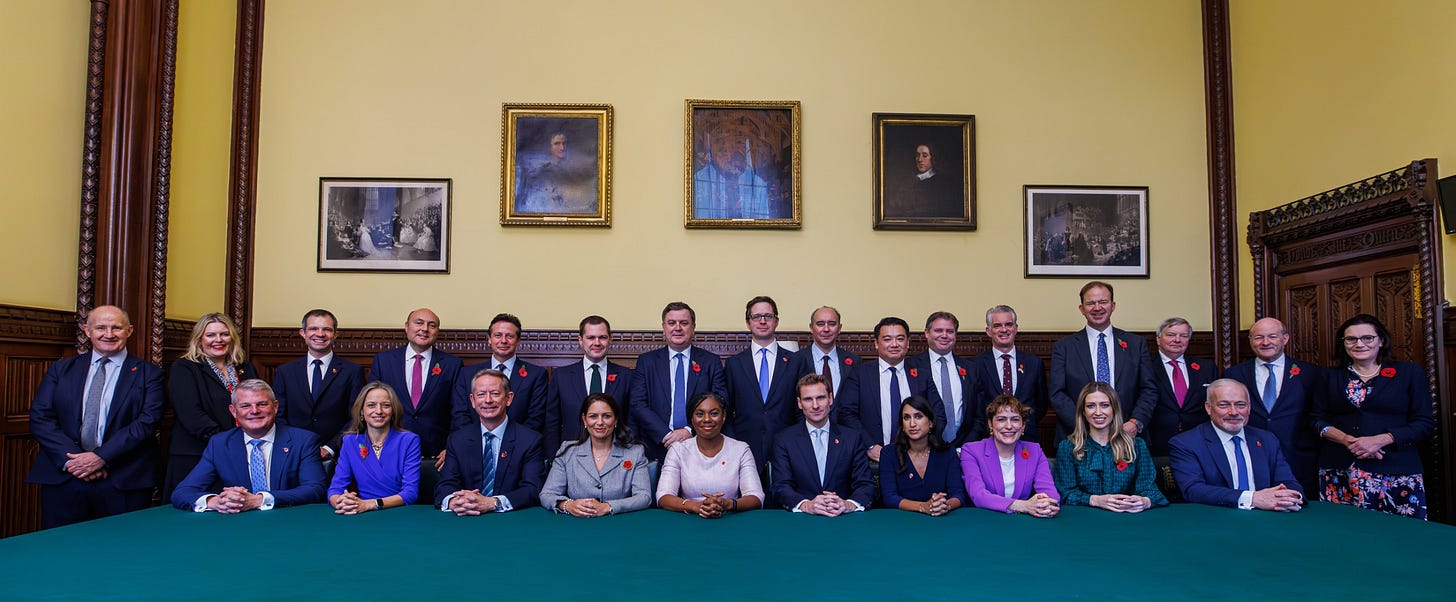Spare a thought for Robert Jenrick. A few hours after being appointed shadow justice secretary — with Kieran Mullan alongside him as the shadow justice minister — Jenrick was bounced back onto his bench by the formidable Alex Davies-Jones. His questions may read well in Hansard but the two minutes of video that I have posted above show how badly the defeated leadership candidate misjudged the position he now finds himself in.
Davies-Jones, MP for Pontypridd since 2019, may be no more than a junior minister at the Ministry of Justice but she dominated her department’s Commons questions yesterday, showing full mastery of the justice brief.
Her secretary of state didn’t get a look-in for half an hour — literally so, as this image shows:
While Davies-Jones was at the despatch box, just about all that could be seen of Shabana Mahmood was a sliver of light-blue fabric behind the junior minister’s right elbow.
Separation of powers
Many of MPs who asked questions yesterday were new to their jobs. But inexperience is no excuse for a failure to understand the proper limits of parliament. Here are a couple of examples:
Peter Bedford (Conservative): A lady from Northampton was recently given a 31-month sentence for a tweet, whereas an individual who incited physical violence on the streets of Birmingham as part of a pro-Palestinian protest received a far lesser sentence. Does the secretary of state agree that such inconsistencies create the perception, at least, that we have a two-tier justice system?
Shabana Mahmood: It is incumbent on members to ensure that such a perception does not take hold and not to inappropriately compare sentences handed out in different types of cases. As the hon gentleman well knows and every member of this house should know, sentences in individual cases are a matter for the independent judges who hear those cases; the trials unfold in front of them…
Robert Jenrick (shadow justice secretary): While of course respecting the judicial process and not commenting on the individual facts of the case, can the secretary of state explain the reported two-week delay between the Crown Prosecution Service making a charging decision with respect to the alleged Southport attacker and it being announced to the general public?
Shabana Mahmood: As the right hon member is now the shadow lord chancellor, may I remind him that we do not comment on cases that are sub judice? That includes commentary that everyone is aware relates to cases currently going through our legal processes. What I will say is that those are independent decisions for the Crown Prosecution Service, which ultimately decides what charges to bring. In live police investigations into complex cases, it is appropriate that those investigations, the charging decisions and, ultimately, the cases are done by the independent parts of the process and that there is no interference from government.
Sir Lindsay Hoyle, the Commons speaker, made it clear that ministers would indeed have to answer the concerns raised by Jenrick — but not until the case he was referring to had been concluded.
Single justice procedure
As usual, not much emerged from ministers’ answers. But there was an announcement about the much criticised single justice procedure, under which a lone magistrate processes a long list of undefended prosecutions with the assistance of a legal adviser. The list of defendants and the penalties they receive is available to reporters but the cases are not dealt with in open court.
“I have listened carefully to concerns raised about the single justice procedure,” said Heidi Alexander, the minister of state.
She continued:
As a first step, I have asked the Courts and Tribunals Service to redesign the single justice procedure and make it clearer. I will also call in single justice procedure prosecutors to discuss ways in which we can ensure that they consider the public interest in advance of making prosecutions…
I am clear that the single justice procedure is vital for the efficient running of the magistrates court. However, it must operate fairly and effectively. I will not tolerate poor practice and I will not hesitate to fundamentally reform the system if that is required.
Alexander’s announcement was welcomed by the chief executive of the Magistrates’ Association, Tom Franklin.
He said:
In March, we called for single justice procedure reform and published 12 recommendations to improve its operation, transparency and fairness. Our recommendations included making it a requirement that prosecutors see all pleas and mitigations from defendants before the cases are heard by the magistrate and improving communication, through a review of the paperwork sent to defendants, to make it simpler and easier to understand.
However, reform needs to go further. We are also urging the government to boost transparency by making provision for single justice procedure sittings to be observable by accredited journalists and by publishing more data on the single justice procedure — such as how many defendants plead guilty, how many make no pleas and how many ask to come to court — nationally and broken down by region.
Shadow cabinet
Who’s missing from this picture?
I can see no sign of Sir Jeremy Wright KC MP, shadow attorney general in Rishi Sunak’s caretaker opposition.
Who, then, will replace him? Will it be an MP to shadow the solicitor general Sarah Sackman KC MP in the Commons or a peer to question her boss Lord Hermer KC in the Lords? We should know soon.
Update 1640: the shadow attorney general will be Lord Wolfson of Tredegar KC, who resigned as a justice minister in Boris Johnson’s government over the “scale, context and nature” of breaches of the criminal law in Downing Street.
He will remain in practice at the bar.
Update 1800: Helen Grant MP, a solicitor and former justice minister, will be shadow solicitor general.
















Share this post